 Downstairs in the Richmond Arms is exactly the sort of place you would expect to find a character from a John Le Carre spy novel. It is also where I am due to meet Nigel Grange of Wild Palm software, one of the more mysterious software authors who have been around since the dawn of Symbian OS on the 9210 Communicators. Nigel is in charge of "a small team of three developers" and helps oversee the 'third party' titles where Wild Palm act as publishers. It's a very corporate
Downstairs in the Richmond Arms is exactly the sort of place you would expect to find a character from a John Le Carre spy novel. It is also where I am due to meet Nigel Grange of Wild Palm software, one of the more mysterious software authors who have been around since the dawn of Symbian OS on the 9210 Communicators. Nigel is in charge of "a small team of three developers" and helps oversee the 'third party' titles where Wild Palm act as publishers. It's a very corporate 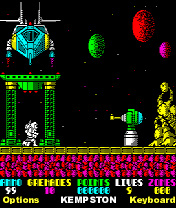 "We don't try to be mysterious – but we try to let our software speak for itself." Nigel oversees all the ongoing projects, and has a hand in quite a bit of the development work as well. So Wild Palm is a full time endeavour for the core three team members? A smile over our respective pints makes this clear. Given Wild Palm's numerous applications regularly appear in 'Top 10 Symbian Applications' lists on the internet, there's obviously a profitable company behind titles like Goboy or CameraFX. Where did it all start?
"We don't try to be mysterious – but we try to let our software speak for itself." Nigel oversees all the ongoing projects, and has a hand in quite a bit of the development work as well. So Wild Palm is a full time endeavour for the core three team members? A smile over our respective pints makes this clear. Given Wild Palm's numerous applications regularly appear in 'Top 10 Symbian Applications' lists on the internet, there's obviously a profitable company behind titles like Goboy or CameraFX. Where did it all start?
Back on the Psion Series 5 is the answer. "When we started, we initially aimed to produce 3D games for the Psion handheld machines, which didn't have anything like that available. The ‘Battlezone’ style was good to start with as this worked well on the limited screen of the Psion. Once the Nokia Communicator arrived, we naturally ported the game over and began to sell the game as shareware to see the market potential (Terra Force was freeware on the Psion machines). This went well, and so the natural progression was to move to the Nokia Series 60 devices when these became available and to expand our software offerings."
But a Symbian based company called Wild Palm? "Unfortunately, there isn't an interesting story behind our name – we started out designing games for the Psion palmtop machines, and Wild Palm seemed a cool name for the project, and it’s stuck!" But it does leave space to expand into Palm OS and Pocket PC – are there any plans to either offer applications on these platforms, or be tempted to switch completely? "Given that we decided to stick with Symbian because there was clearly a lack of software companies developing for the platform (compared to the Palm or Pocket PC platforms). Also, getting and maintaining a market share was much easier. We don't rule out developing for other platforms in the future, but for the moment we plan to stick with what we’re most experienced at."
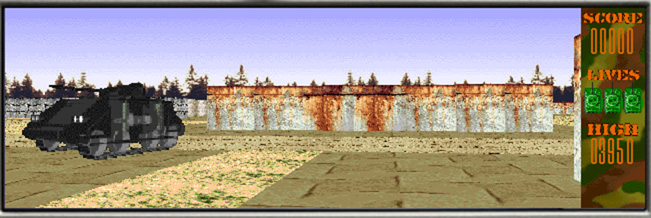
Personally, I let out a sigh of relief at this news. After all, Wild Palm has done more for gamers than most with their Series 60 emulations of the original Gameboy and ZX Spectrum. Nigel let me play Jet Pac and Starquake on my 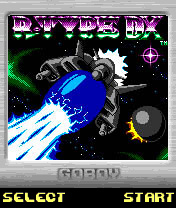 And then ask for money for some 'extra' features? I raise an eyebrow. After all, every company needs to pay the rent. How popular are the enhanced versions of Goboy and ZXBoy – after all, the emulation scene isn't a strong commercial area. Nigel agrees. "We never intended to release the emulators as commercial projects. However, once the initial freeware versions were made available, we had an overwhelming response for more features. We then decided to make additional features available as an additional package, in order to pay for the development of new versions. Generally, most people still stick with the freeware versions, which is fine, but there are enough supporters of the additional versions to allow us to spend time on new versions, and to give them the same development priority as our other projects."
And then ask for money for some 'extra' features? I raise an eyebrow. After all, every company needs to pay the rent. How popular are the enhanced versions of Goboy and ZXBoy – after all, the emulation scene isn't a strong commercial area. Nigel agrees. "We never intended to release the emulators as commercial projects. However, once the initial freeware versions were made available, we had an overwhelming response for more features. We then decided to make additional features available as an additional package, in order to pay for the development of new versions. Generally, most people still stick with the freeware versions, which is fine, but there are enough supporters of the additional versions to allow us to spend time on new versions, and to give them the same development priority as our other projects."
So we can look forward to an Acorn Electron emulator? We laugh as we head for another round of drinks and catch site of a battered Defender cabinet in the corner. I didn't choose this pub by accident, guessing that Nigel and Wild Palm appear to be heavily into gaming. Then again, so am I, and after 20 minutes on the Williams Classic, we return to the interview, and stay on the gaming issue.
Can a small shareware house like Wild Palm hope to compete against Nokia's 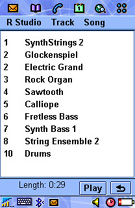 "Of course we can! There's a huge amount of competition in the phone games market. On the
"Of course we can! There's a huge amount of competition in the phone games market. On the
What do you make of the current market place for Symbian applications? "It has gone absolutely huge over the last year." Enough to sustain your three developers and the freelancers? "Yes. It's exciting, but also adds a lot more competition! One of the most important things is that the phone companies are starting to push 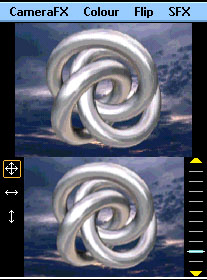 You started with "Terra Force," but while it'd be easy to pin down Wild Palm as a games company, you don't restrict yourself to one genre. You have first person games, side scrolling adventures, ringtone editors and a Zip File Manager. Would you say you program for yourself first and the market second?
You started with "Terra Force," but while it'd be easy to pin down Wild Palm as a games company, you don't restrict yourself to one genre. You have first person games, side scrolling adventures, ringtone editors and a Zip File Manager. Would you say you program for yourself first and the market second?
"Right – we haven't tried to limit ourselves to one type of software. Although we started as a games developer, when the Nokia Series 60 phones started to appear, the market for applications was basically empty, so we were able to develop applications which both interested ourselves, and were commercially viable. So far, it’s been possible to continue in this way, since the market is still far from congested. If we have a need for an application that’s not available, there’s a good chance that other users will need such an application as well."
It's approaching closing time, so time for one last question. What's in store for Wild Palm in the next six months? "Wild Palm has a clear software strategy for the next few months, based on our last
Which is suitably vague enough that I haven't a clue! Sounds fun though, just like Nigel and the Wild Palm software line up. As we leave the bar, it'd be fair to say that Nigel's enthusiasm for the Symbian scene is very high, and that Wild Palm are going to continue to be one of the leading software houses for the near future.
And while he can sink a pint of Guinness, he's useless at Defender.
